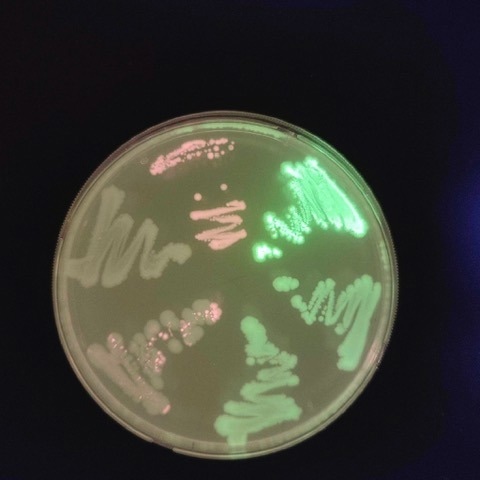Researchers at the Hebrew University of Jerusalem (HU), in collaboration with bioproduction platform company Enzymit, developed a protein-based biosensor that can accurately detect landmines and a range of other TNT-based unexploded ordnance (UXO).
 Red and green luminescence indicating TNT detection. Credit: Enzymit
Red and green luminescence indicating TNT detection. Credit: Enzymit
Utilizing Enzymit's proprietary algorithms and experimental capabilities, the sensor was optimized to be up to five times more sensitive, with faster reaction times, and a signal strength 30 times stronger than the original construct. The efficacy of the solution is reported in a paper published recently in the Computational and Structural Biotechnology Journal.
Shimshon Belkin, a professor of Environmental Microbiology and head of the Environmental Microbiology and Biosensor Laboratory at the Hebrew University, pioneered the bacterium-based approach to detect explosives. The lab developed a live cell-based sensor, capable of detecting even trace amounts of the explosive DNT (2,4-Dinitrotoluene) emitting bioluminescence to precisely identify the material location.
"The global proliferation of landmines continues to pose a serious threat to human lives and the environment, and traditional detection methods are costly, time-consuming, and life threatening," said Prof. Belkin. "This collaboration highlights the potential of synthetic biology in solving some of the world's most pressing problems, with applications that go beyond landmine detection." The lab has spent over a decade researching biosensing solutions for explosives detection. This project resulted in the creation of a sophisticated biosensing platform utilizing the bacterium E. coli* that can detect trace amounts of DNT, the volatile byproduct of TNT that leaks out of mines into the surrounding earth. The E. coli causes the bacterium to die out shortly after deployment, ensuring it does not pose any human or environmental risk.
The Belkin and Enzymit teams are currently working to further optimize the system, while exploring how application of the biosensing platform can be expanded to detect other hazardous materials, such as alternative forms of explosive, environmental toxins, and hazardous chemicals.
"We are honored to partner with Professor Belkin's team and the unparalleled contribution they have made to the development of biosensing solutions for explosives detection," said Gideon Lapidoth, Ph.D., CEO of Enzymit. "This project marks a breakthrough in the field of landmine detection, while demonstrating the incredible potential of harnessing the synergy between synthetic biology and AI for a future where humanitarian and environmental challenges can be met with safe and sustainable solutions."